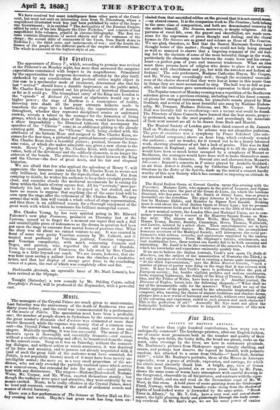tOt litatrrs.
The appearance of Henry V, which, according to promise was revived at the Princess's on Monday night, has more than answered the sanguine expectations entertained with respect to its magnificence. Stimulated by the opportunities for gorgeous decoration afforded by the play itself, unchecked by any consideration that poetical critics might object in this case to a spectacular mode of treatment, determined also that his last " revival ' should leave a durable impression on the public mind, Mr. Charles Kean has carried out his principle of historical illustration as far as it could go. The triumphant entry of the King into London is the "episode" of Richard II., raised as algebraists would say to a higher power ; the siege of Harfieur is a masterpiece of reality, throwing into shade all the puny attempts hitherto made to transform the stage into a battle-field; the organization of masses, throughout, whether they represent disciplined armies or unfettered crowds, reveals a talent in the manager for the formation of living groups, which in the palmy days of the drama, would have been deemed a sheer impossibility ; the illumined tableaux that accompany he speeches of the " Chorus " come in as additional gilding to the already existing gold. Moreover, the "Chorus" itself, being clothed with the attributes of the historic Muse and assigned to Mrs. Charles Kean, as- sumes for the first time, a pictorial and poetical interest—pictorial because Mrs. Charles Kean looks a beautiful picture ; poetical, because the femi- nine voioe, of which she makes admirable use, gives a new charm to the words. Henry V., played by Mr. Charles Kean, with excellent preser- vation, both of the devotional and the soldierly elements, is no longer the autocrat of the boards. The attractive force is shared between the King and the Chorus—the doer of great deeds, and his fair and eloquent historian.
We are afraid that few who applaud the splendour of Henri V. will appreciate the immense pains taken by Mr. Charles Kean to secure not only brilliancy, but accuracy in the reproduction of detail. Far from essaying to dazzle, he wishes his audience to keep their eyesight perfectly clear, and examine closely the mediteval monuments he is raising for them within the limits of every square foot. All his "revivals," more par- ticularly his last, are things not to be gaped at, but studied, and we have no reason to suppose that anything else of the same kind will be seen upon the stage after the retirement of Mr. Charles Kean. We may assume that with him will vanish a whole school of stage representation, and thus there is an additional reason for a thorough enjoyment of the great work with which he terminates his brilliant managerial career.


























 Previous page
Previous page